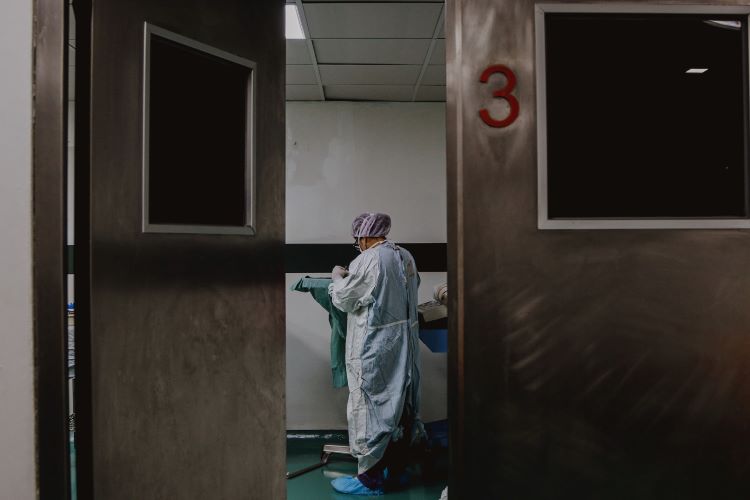Quick Links for Alcoholism in the Medical Profession
- How are medical professionals vulnerable to alcoholism?
- Reasons for alcoholism in the medical profession
- Alcoholism in the medical profession: what are the dangers?
- Identifying alcoholism with medical professionals
- Treating alcoholism and addiction in the medical profession
- Getting support from OK Rehab for alcoholism in the medical profession
- References for alcoholism in the medical profession
Developing an addiction to alcohol can be incredibly dangerous for an individual, both for their physical and psychological health.
When that individual works within a medical profession, these risks are joined by a variety of others.
Studies from all over the world suggest that alcoholism in the medical profession is common, and in fact, one of the most affected industries. [1]
While this does not mean that everyone within this occupation will develop it, we need to be aware of the prevalence and what the most effective treatments are.
How are medical professionals vulnerable to alcoholism?

Doctor and patients discussing alcoholism in the medical profession
The causes of addiction are important to identify because they can hold the key to effective treatment and appropriate medical support.
The reasons why alcohol abuse among medical professionals and health care professionals develops can be varied, but there are some common factors.
Professional pressures
It is no secret that doctors and nurses work incredibly hard.
They are always busy, and many work long hours in stressful jobs that can seriously drain them both physically and mentally.
When medical professionals become overwhelmed by their schedules, they can experience immense exhaustion and frustration, possibly even self-judgement as to why they chose to go into such a demanding line of work.
In order to cope with this workload and the emotions it triggers, individuals can turn to alcohol.
Experiencing the high it provides can relax them in the evenings, and they can quickly become reliant on drinking in order to feel capable of carrying on.
To find out more about alcoholism in the medical profession, simply reach out to our 24/7, confidential hotline on 0800 326 5559
Regret and sadness

Doctor in a hospital thinking about alcoholism in the medical profession
Unlike most other professions, being a doctor or nurse puts individuals into very difficult and emotionally challenging situations.
Injury and death are day-to-day occurrences, and professionals can be affected by these things.
For example, if a patient dies or cannot be saved from a life-altering injury, medical professionals can feel intense guilt or remorse.
The bonds they develop with patients can cause serious pain and regret, and these emotions are difficult to get over.
To alleviate this pain, individuals can use alcohol as an anaesthetic. They can start drinking to avoid emotional anguish, eventually developing a physical dependency on its effects.
Poor mental health
It is common among those who develop addictions to also experience another mental health condition.
Anxiety, depression, and trauma are common triggers for addictive behaviour, and this is professionally referred to as dual diagnosis.
Many people can handle their mental health difficulties, but professions within the medical field usually involve intense, stressful days at work that can trigger and exacerbate the negative emotions associated with anxiety, for example.
Unfortunately, this frequent stress can incentivise the use of alcohol as a way of staying calm and ensuring work performance, [2] a habit which soon turns into physical dependency.
Reasons for alcoholism in the medical profession

Woman looking stressed and thinking about alcohol alcoholism in the medical profession
It isn’t just alcohol that individuals can turn to in order to cope with the various stresses and demands imposed by working in the medical profession. Addiction to drugs is an equally serious risk.
Particularly, those who have access to prescription drugs such as benzodiazepines and opioids can be tempted to use them themselves as a way of handling stress.
Alcoholism in the medical profession: what are the dangers?

Doctor researching alcoholism in the medical profession
When alcohol abuse strikes for someone working in a medical profession, the effects can be detrimental to their physical and psychological health, as well as their professional career.
Below we outline some of the key ways in which alcoholism can impact those working as medical professionals and health care professionals.
Alcoholism and health
Those who develop a dependency on alcohol are first and foremost at risk of suffering in terms of their physical health.
Common symptoms include:
- Increased risk of developing serious health conditions such as liver disease and several types of cancer
- Increased blood pressure and risk of cardiac problems
- Long-term memory and cognitive issues
- Weakened immune system, increasing the frequency of illness and tiredness
As well as the physical, alcohol dependency causes a lot of psychological and emotional issues.
Individuals can experience mood swings, unpredictable behaviour, and frequent spells of anxiousness or depression.
The presence of these issues can also spark social complications, with violent outbursts potentially creating conflict with the law or emotional outbursts causing distress among family and friends. [3]
Alcoholism and career
Those within medical professions have to think about the effects that their behaviour has on their career as well as just their own personal wellbeing.
Being a doctor or nurse is a very serious position, and alcoholism can trigger some of the following problems:
- Failing to attend shifts
- Making mistakes with diagnoses, prescriptions, and operations
- Creating tension with colleagues and patients
- Inciting legal action due to malpractice
All of these symptoms can have very serious consequences, both for an individual’s career and the well-being of the patients in their care.
Identifying alcoholism with medical professionals

Person holding their glasses and rubbing their eyes whilst contemplating alcoholism in the medical profession
<.div>
With such serious risks, it is essential to be able to identify the signs of alcoholism in the medical profession
Colleagues and supervisors can therefore look out for the following traits:
- Frequent absences and a general inability to be on-time
- Physical signs of alcohol use, including slurred speech and inhibited motor skills
- Lack of participation in social spheres and general isolation from others
- Evidence of alcohol use, including empty bottles or alcohol receipts
- Hostility or aggression towards others
- Immediate and excessive excitement when drinking is mentioned
- Decrease in overall hygiene
Some of these signs are more subtle than others, so if you are concerned about a friend or colleague, it can help to work together with their friends or family to identify consistent behaviour patterns.
To find out more about alcoholism in the medical profession, simply reach out to our 24/7, confidential hotline on 0800 326 5559
Treating alcoholism and addiction in the medical profession

Doctor and therapist discussing alcoholism in the medical profession
Once alcohol abuse has been identified, it is important to treat it immediately.
The severity of an individual’s condition will influence what route of recovery they take, but support should not be delayed lest the problem be given time to get worse.
Alcohol addiction rehab
The most efficient and safest method of treating alcoholism in the medical profession is rehab, a process which involves individuals going through treatment within a facility where they can benefit from supervision and support.
Rehab is made up of a few central stages, the first being an alcohol detox. This involves individuals cleansing themselves of their physical need to drink alcohol.
This process is often supported by benzodiazepine prescriptions that dull withdrawal and ease the body’s transition to sobriety.
Following this, a few weeks are spent working through addiction therapy, a process that looks very different for each person.
Whether engaging with group therapy, Cognitive Behavioural Therapy (CBT), or another method, the goal of this stage is to recognise and treat the underlying triggers of an individual’s harmful behaviour.
Finally, all individuals are encouraged to create a relapse prevention plan which works to help them maintain their progress in the difficult weeks and months following their departure from treatment.
Outpatient support for alcoholism

Older woman in an outpatient treatment facility talking about alcoholism in the medical profession
Alternatively, individuals can receive treatment via the outpatient method which involves regular meetings with an addiction specialist, rather than entering a treatment facility.
Being much more flexible, this option allows for a treatment plan to be agreed upon by an individual and professional that suits both their treatment needs and wider schedule.
Sessions can focus on whatever is agreed to be necessary, but it must be noted that outpatient care is only suitable for less severe alcohol dependencies.
If an individual is not able to look after themselves or is a danger to others as a result of their symptoms, residential alcohol rehab is often required.
Determining the severity of a dependency can be done via an Alcohol Use Disorders Identification Test (AUDIT). [4]
Getting support from OK Rehab for alcoholism in the medical profession

People holding hands and discussing alcoholism in the medical profession
Alcoholism among medical professionals and health care professionals can be dangerous for an individual, their colleagues, and patients, so it is essential that those who need help reach out and ask for it.
There are a range of alcohol treatment options across the UK, and OK Rehab can help with both the identification and enrolment onto appropriate and effective recovery routes.
If you are concerned about your own alcohol use, or that of someone that you care about, don’t hesitate to get in touch.
To find out more about alcoholism in the medical profession, simply reach out to our 24/7, confidential hotline on 0800 326 5559.
References for Alcoholism in the Medical Profession
[1] https://www.ncbi.nlm.nih.gov/pmc/articles/PMC1834675/pdf/bmj00307-0029.pdf






